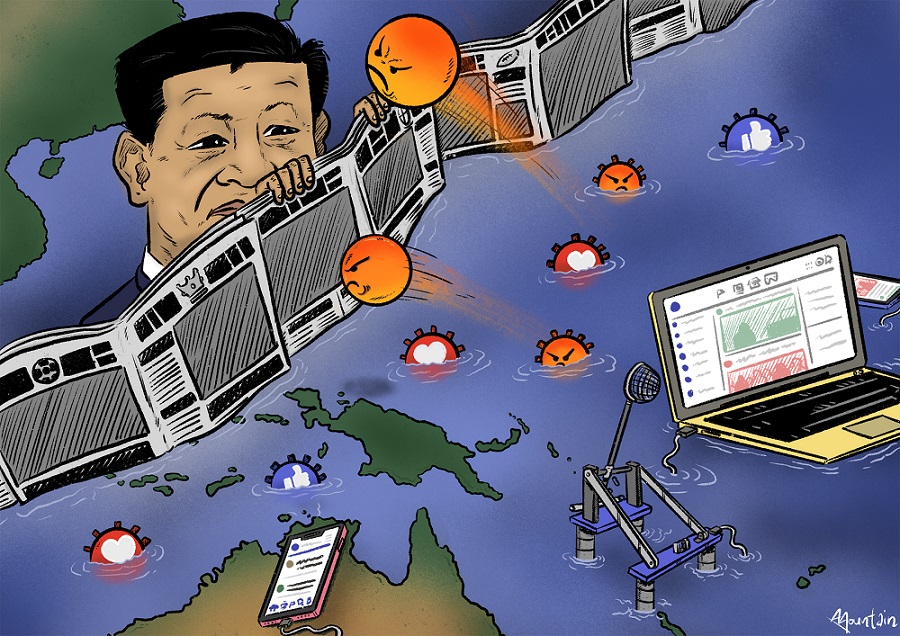
The Chinese Communist Party is attempting to use the Pacific islands online information environment to undermine Pacific island democracies and relationships with other partners. Some of the CCP’s messaging occurs through routine diplomatic engagement, but there’s also a persistent coordinated effort to influence Pacific island populations by amplifying narratives critical of Western partners. This occurs across a broad spectrum of information channels, including party-state media, articles and statements by CCP officials in local and social media, and official party-state Facebook groups.
However, the CCP’s attempts have so far had limited success in swaying public opinion or generating the desired online response to real-world events. A new ASPI report, released today, examines the level of activity and effectiveness of each of these channels of influence across Pacific island countries. The analysis expands on our previous report on the CCP’s influence on the Solomon Islands online information environment and includes quantitative analysis of social media penetration, online engagement and the effectiveness of the CCP’s messaging through three case studies.
Following the AUKUS partnership announcement in September 2021, the CCP attempted to spread a narrative critical of AUKUS but failed to generate anti-Western sentiment online in the Pacific. Pacific commentary actually shifted towards greater anti-China sentiment and pro-Western sentiment following the CCP’s efforts to influence the regional discourse on AUKUS.
Attempts by party-state media and embassy officials to criticise and negate Western and local concerns over the CCP’s attempts to reach a regional security agreement in early 2022 had little impact on online sentiment. The Pacific online population had a greater proportion of negative responses towards CCP official statements in local media compared to those produced by local Pacific journalists.
And the CCP’s efforts to frame the United States and Australia as colonialist and belligerent in the wake of the Pacific Islands Forum in July 2022 also had little penetration into local reporting of the forum.
Analysis of Facebook posts across Pacific subregions showed a greater ratio of negative commentary towards China in Polynesia compared to Melanesia. Polynesia had eight times as many negative comments as positive towards China, and Melanesia had twice as many negative comments as positive towards China. This indicates a difference between subregions in the way online populations perceive China and CCP engagement in their countries.
Further supporting the findings of our Solomon Islands report, the CCP generated the highest level of engagement through the publication of official statements, opinion pieces and press releases in local media. These publications have greater access to the Pacific islands online population through trusted local media sources and allowed the CCP to spread its message to a wider audience. Other information channels, such as party-state media and embassy Facebook pages, were less effective in generating online engagement.
ASPI has also identified an emerging trend in the use of Pacific voices to support the CCP’s global messaging. Members of several China – Pacific island friendship associations (groups linked to the CCP’s United Front) had contributed to CCP party-state media by providing interviews, comments or published opinion pieces in media outlets such as the Global Times, the People’s Daily and China Daily. Some had also published CCP-aligned content in local Pacific media. So far, these few articles have had limited penetration and impact in the Pacific islands online information environment, but this emerging avenue of influence should continue to be monitored.
Our report refines and improves on our baseline understanding of the CCP’s activities and online influence across the Pacific region. The findings can be used to identify which online information channels are of most concern and more accurately detect shifts in the activity levels or effectiveness of CCP information operations over time or between events. Not all CCP information operation attempts are equally successful, and governments need to better understand which narratives and practices are most effective in order to prioritise efforts in countering the CCP’s false narratives in the region.
Pacific partners—particularly Australia and the US—need to be more active, effective and transparent in communicating how aid delivered to the region is benefiting Pacific island countries and building people-to-people links. Doing so will debunk some of the CCP’s narratives regarding Western support and legitimacy in the region.
The Pacific’s democratic partners also need to increase support to, and enhance partnerships with, Pacific island media outlets and associations in order to build a strong and more resilient media industry that is less vulnerable to disinformation and external influences. Australia’s robust, independent and neutral media institutions should be at the forefront of these partnership-strengthening efforts, especially the ABC, which could be provided with additional funding to play a greater role in training, long-term secondments and hosting regional staff exchanges across the Pacific islands region.
Our report seeks to better understand just one aspect of the CCP’s influence efforts across Pacific island countries, focusing on strategic narrative and information operations targeting the region’s online population. But the CCP’s efforts to undermine democracies and traditional partnerships in the region can also target specific groups, such as political elites, and occur across a wide range of vectors, including infrastructure and security assistance, all of which need greater exploration and analysis.

